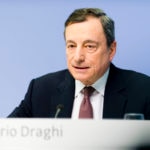Mario Draghi lays out comprehensive response
All eyes were on the possibility yesterday that the European Central Bank (ECB) could make changes in the forward guidance on rate and on a potential announcement of new liquidity measures. And Mario Draghi didn’t disappoint: he answered both questions. He announced that the ECB will keep interest rates on hold until at least the end of this year and another series of auctions of long-term liquidity. BBVA Research has just released an ECB Watch report covering and assessing the measures announced by Draghi.

For years, the ECB has maintained that it stands ready to adjust all of its monetary policy instruments to ensure sustainable convergence towards the inflation target. And yesterday, the European body reaffirmed its stance. Chairman Mario Draghi stressed that this package of measures approved during the ECB’s March meeting are reinforcing the bank’s “accommodative” policy stance and that the decision was taken by unanimity.
However, as BBVA Research points out, this time there was a debate within the ECB General Council, as several members proposed extending the calendar of forward guidance to March 2020 and other members discussed consequences of “low for longer” rates on banks.
These are the two measures announced in detail. On the one hand, the ECB delayed its expectations concerning rate hikes, from summer 2019 through, at least, the end of the year. Thus, the interest rate on the main refinancing operations and the interest rates on the marginal lending facility and the deposit facility will remain unchanged at 0.00 percent, 0.25 percent and -0.40 percent respectively.
On the other hand, the ECB announced a new series of quarterly targeted long-term refinancing operations aimed at banks, with longer maturities and a specific objective. These liquidity auctions, known as TLTRO-III (for its acronym in English), will launch on September 2019 and end on March 2021, each with a two-year maturity. The program envisages seven operations.

Mario Draghi, president of the European Central Bank
Downbeat economic prospects
Regarding economic forecasts, Draghi acknowledged that the slowdown in international demand, along with some country and sector specific factors, have resulted in weaker-than-expected growth since mid-2018 that seems to extend into this year. As a result, the ECB has sharply downgraded its GDP growth forecasts 6 basis points to 1.1 percent in 2019. For 2020, its revision has been much more moderate, only 1 basis point, to 1.6 percent. The forecast for 2021 remains unchanged at 1.5 percent.
The likelihood of a recession and the de-anchoring of inflation expectations remain very low
However, as BBVA Research’s report points out, Draghi noted that the balance of risks remains tilted to the downside despite the downward revision, as today’s ECB’s decisions cannot solve global headwinds hitting the Eurozone. However, Draghi stressed that "the likelihood of a recession and the de-anchoring of inflation expectations remain very low."
The ECB Watch concludes that, in general, the ECB's message has been more dovish than expected. Thus, it considers that the ECB’s reaction to the gloomier economic outlook for Europe with this combination of measures was mostly positive. "Though many details are lacking, it provides more liquidity than expected," the report concludes.